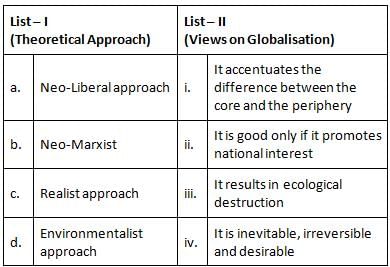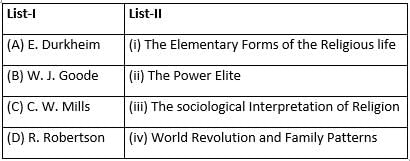UGC NET Paper 2 Sociology Mock Test - 9 - UGC NET MCQ
30 Questions MCQ Test UGC NET Mock Test Series 2025 - UGC NET Paper 2 Sociology Mock Test - 9
Which of the following are the Issues of Information Society?
(A). Digital Divide
(B). Rapid Knowledge Creation
(C) Privacy and Freedom
(D). Workforce Engagement in Knowledge Activities
Which of the following are the two essential features of cyber crime?
Why does the author mention that sociology implicitly was a masculine sociology?
The historical failure to recognize the particular standpoints from which they spoke in sociology led to what?
What regions are expected to experience much of new urbanization?
What are some negative impacts of urban sprawl as noted in the passage?
Direction In the question given below are two statements labelled as Assertion (A) and Reason (R), In the context of the two statements, which one of the following is correct?
Assertion (A) Language gives humans a means by which to negotiate meaning through symbols.
Reason (R) Naming assigned meaning, thus naming was the basis for human society and the extent of knowledge.
Assertion (A) : Big Data is a product of data being generated constantly, automatically, and rapidly.
Reason (R) : Due to the omnipresence of personal computing devices and smart phones, individuals generate massive amount of data through e-commerce, e-communication, social media, online searches and GPS Navigation.
In the context of these two statements, which one of the following is true?
Direction In the following question given below was two statements labelled as Assertion (A) and Reason (R). In the concept of two statements, which of the following is correct?
Assertion (A) Technology has helped develop more advanced economies.
Reason (R) Technology has made life more hectic.
Which of the following statements is correct?
1. The biggest cause of the digital divide is socioeconomic inequality.
2. Broad level of education promotes the digital divide.
Which among the following are the barriers in the implementation of e-Governance?
1. Unequal access to the computer technology.
2. High initial cost for setting up the e-government solutions.
3. Digital security issues.
4. Resistance to change.
Choose the correct codes
Direction: In the question given below are two statements labelled Assertion (A) and Reason (R). In the context of the two statements, which among the following is correct?
Assertion (A): Pilgrimage is a journey or search for moral or spiritual significance.
Reason (R): People going on pilgrimage are of communal nature.
Match the List - I with List - II and select the correct options from the codes given below.

Direction: In the question given below are two statements labelled as Assertion (A) and Reason (R). In the context of the two statements, which among the following is correct?
Assertion (A): Weber studied Hinduism.
Reason (R): He found that modern capitalism does not develop here due to outer worldly orientation.
What differentiates state from the nation?
According to whom anthropology is a natural science and studies human society, often using the methods of the natural sciences?
In a normal distribution the Mean, Median and Mode are located at:
Consider the following statements :
1. The provisions of Part IX of the Constitution relating to the Panchayats are not applicable to the Fifth Schedule Areas.
2. At present seven states have Fifth Schedule Areas.
3. The Parliament enacted the PESA Act in 1996 for such areas.
Which of the above statements is/are correct?
Given below are two statements, one is labelled as Assertion (A) and the other as Reason (R).
Assertion (A): The number of slum-dwellers varies from agency to agency
Reason (R): Because all of them follow different definitions of slums
Who has divided family into 'Family of Orientation' and 'Family of Procreation'?
The choice of mates in the caste system is generally
Why did the term 'civil society' became popular in the 1980s?
What are the conditions in which Type-I error occurs?
Match List-I with List-II and select the correct answer from the codes given below:

A, B, C, and D are respectively.
"Thinking is simply an internalized or implicit conversation of the individual with himself by means of significant gestures". Who said so?
Which of the following statement is correct regarding Gender?
- Gender roles are culturally influenced rather than biologically determined as it is developed by society by segregating the works, and cultures, on the basis of the sex of people.
- The cultural conception of gender divides the entire boundaries of human quality into two opposite areas of masculinity and womanhood and their regressive behavior.
|
92 docs|125 tests
|














